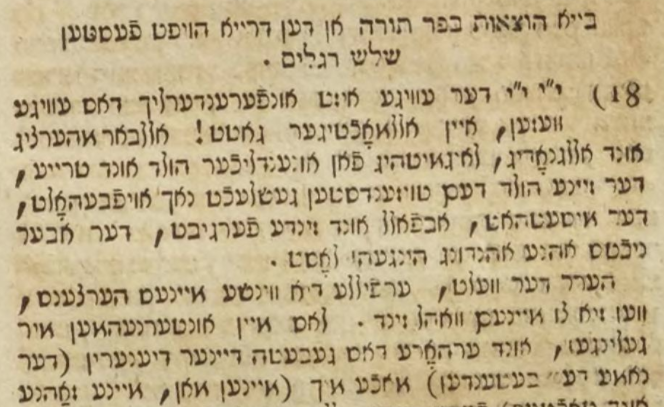| Source (German) | Translation (English) |
|---|---|
Zur Zeit der Niederkunft. |
At the time of childbirth. |
Allmächtiger Gott, gerechter und allweiser Richter! du hast dem weiblichen Geschlechtdte Bestimmung gegeben mit Schmerzen Kinder zu gebähten. Schon die Betrachtung das Fürstinnen und Kömginnen der Erde mit dem ärmsten Weibe ein gleiches Schickfal haben; vaß kein Reichthum, keine Macht auf Erden, eine Frau, von den mit ihrer Entbindung verknüpften Schmerzen befreien kann, sollte uns trösten zur Zeit der Niederkunft, wenn Geburtschmerzen uns überfallen. Denn es ziemt den frommen gottergebenen Menschen, sich in das unvermeidliche zu fügen. Wenn wir in dem festen Glauben leben, daß dem Menschen auf Erden kein Haar gekrümmt werden könne, ohne deine Bestimmung, und daß dennoch in diesem schwerem Augenblick die eine Frau mehr zu leiden hat als die andere, so können wir nicht umhin zu glauben, daß unser Benehmen, unser Leben als Mensch überhaupt und als Israelit ins Besondere Einfluß auf unsere Begegnisse im Leben haben. So bitte ich dich denn, Gott der Gnade und der Barmherzigkeit in diesem schweren Augenblick, dem ich entgegen gehe, deine Eigenschaften des Wohlwollens und der Barmherzigkeit walten zu lassen (מדת החסד ורחמים). Ich ergebe mich deinen Willen Herr, dein Wille geschehe! Nur laß mich den Muth und die Kraft in dieser schweren Stunde nicht verlieren, Laß mich stets meiner Bestimmung eingedenk sein, Wesen in die Weit zu setzen deren Bestimmung es ist, dich zu verehren, deinen Namen zu verherrlichen auf Erden. |
Almighty God, just and all-wise judge, you have given the female sex the destiny to bear children with pain. The very consideration that princesses and queens of the earth have the same fate as the poorest woman; that no wealth, no power on earth can free a woman from the pain associated with her childbirth, should comfort us at the time of childbirth, when birth pains assail us. For it befits pious godly people to submit to the inevitable. If we live in the firm belief that not a hair of man’s head can be harmed on earth without your determination, and that nevertheless in this difficult moment one woman has to suffer more than the other, then we cannot help but believe that our behavior, our life as a human being in general and as an Israelite in particular have an influence on our encounters in life. So I ask you, God of grace and mercy, in this difficult moment I am approaching, to let your qualities of benevolence and mercy prevail (מדת החסד ורחמים). I surrender to your will Lord, your will be done! Only let me not lose courage and strength in this difficult hour, let me always be mindful of my destiny to put beings into the world whose destiny it is to worship you, to glorify your name on earth. |
Ewiger, allgütiger Gott, der Mensch ist nie so fromm auf Erden daß er stets Gutes thue, und nie sündige. Ich bin mir bewußt oft wieder deinen Willen gehandelt zu haben. Du aber bist der Gott der Gnade, langmüthig und von großer Güte. Nicht meiner Sünden gedenke in diefer Stunde, vielmehr fei eingedenk der Frömmigkeit meinerguten Eltern und Voreltern, und laß dir wohlgefällig sein die Wortemeines Mundes, und die Gedanken meines Herzens. Die Gelübde die ich in diesem Augenblicke thue meinen Wandel auf Erden dir wohlgefällig, einzurichten, und das Kind, welches ich durch deine unerschöpfliche Gnade zur Welt bringen foll, dir zur Ehre, und der menschlichen Gesellschaft zur Freude zu erziehen, nimm gütig auf, Gott mein Schützer und Erretter, der du nie schläfst, nie schummerst, Hüter Israels. Amen. |
Eternal, all-good God, man is never so pious on earth that he always does good and never sins. I am aware that I have often acted against your will. But you are the God of grace, long-suffering and of great kindness. Do not remember my sins in this hour, but rather remember the piety of my good parents and forefathers, and let the words of my mouth and the thoughts of my heart be pleasing to you. The vows I make at this moment to make my life on earth pleasing to you, and to bring up the child, which I will bring into the world by your unfailing grace, to your honor and to the joy of human society, receive graciously, God, my protector and savior, you who never sleep, never drowse, guardian of Israel. Amen. |
“[Gebet] Zur Zeit der Niederkunft” was translated/adapted by Yehoshua Heshil Miro and published in his anthology of teḥinot, בית יעקב (Beit Yaaqov) Allgemeines Gebetbuch für gebildete Frauen mosaischer Religion. It first appears in the 1829 edition, תחנות Teḥinot ein Gebetbuch für gebildete Frauenzimmer mosaischer Religion as teḥinah №58 on pp. 84-85. In the 1835 edition, it appears as teḥinah №60 on pp. 106-108. In the 1842 edition, it appears as teḥinah №63 on pp. 111-113.
We welcome corrections and improvements. The transcription of the German from Latin script in Fraktur type provided machine-readable text for a machine translation by DeepL, which we then edited for accuracy and clarity. –Aharon Varady
Source(s)



“[Gebet] Zur Zeit der Niederkunft | Prayer at the time of childbirth, a teḥinah by Yehoshua Heshil Miro (1829)” is shared through the Open Siddur Project with a Creative Commons Attribution-ShareAlike 4.0 International copyleft license.







![[Gebet] Vor der Entbindung | [Prayer] Before the Childbirth, by Fanny Neuda (1855)](https://opensiddur.org/wp-content/uploads/2020/02/Vor-der-Entbindung-Fanny-Neuda-1864-cropped.png)


Leave a Reply